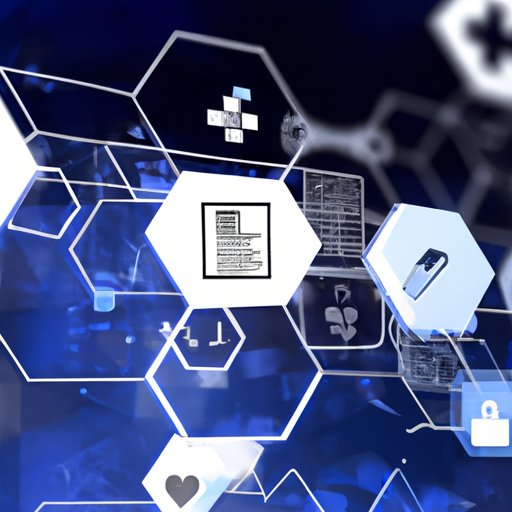Introduction
Blockchain technology is rapidly gaining recognition for its potential to revolutionize the healthcare industry. The combination of distributed ledger technology and sophisticated cryptography offers a secure and transparent way to store and share sensitive data. In this article, we’ll explore the benefits and challenges of blockchain in healthcare, how it can improve patient care and lower costs, and the role of blockchain in modernizing healthcare systems.
What is Blockchain?
Blockchain is a type of distributed ledger technology that uses cryptographic algorithms to create a secure, tamper-proof record of transactions. It is a decentralized system that is not controlled by any single party, and it is designed to be immutable and resistant to tampering or manipulation. Data stored in the blockchain is encrypted and can only be accessed by authorized users.

Exploring the Benefits and Challenges of Blockchain in Healthcare
As the healthcare industry continues to grapple with the threat of cyberattacks and data breaches, blockchain technology presents an attractive solution for improving data security. By encrypting and distributing sensitive data across multiple nodes, blockchain can provide enhanced protection against unauthorized access and malicious actors. Additionally, blockchain technology can help streamline administrative processes and reduce overhead costs associated with managing patient data.
How Blockchain Could Revolutionize Healthcare Data Security
Benefits of Blockchain for Healthcare Data Security
Blockchain technology offers several advantages for healthcare data security. First, because data stored in the blockchain is encrypted and distributed across multiple nodes, it is extremely difficult for malicious actors to gain access to sensitive data. Additionally, blockchain technology makes it easier to track and trace data, allowing administrators to quickly identify any suspicious activity. Finally, blockchain technology can also help reduce the risk of data breaches by providing a tamper-proof record of all transactions.
Challenges of Blockchain for Healthcare Data Security
While there are many potential benefits of using blockchain technology for healthcare data security, there are also some challenges that need to be addressed. For example, blockchain technology requires significant computing power and bandwidth, which may be cost prohibitive for some healthcare organizations. Additionally, blockchain technology is still relatively new and largely unregulated, so it may be difficult to ensure compliance with existing healthcare regulations.
What is the Potential of Blockchain in Healthcare?
In addition to data security, blockchain technology has the potential to revolutionize other aspects of the healthcare industry. Here are some of the potential benefits of blockchain technology in healthcare:
Improved Patient Care
By providing a secure and transparent way to store and share patient data, blockchain technology could help improve the quality of patient care. Doctors and other healthcare providers would have easy access to a patient’s complete medical history, allowing them to make informed decisions about treatment. Additionally, blockchain technology could help reduce the risk of medical errors by eliminating manual data entry.
Lower Costs
Blockchain technology could also help reduce healthcare costs by streamlining administrative processes and reducing overhead costs associated with managing patient data. By eliminating redundant paperwork and automating processes, healthcare organizations could save time and money.
Improved Health Information Exchange
Finally, blockchain technology could help improve the exchange of health information between healthcare organizations. By providing a secure and reliable way to share patient data, blockchain technology could facilitate better collaboration between providers and make it easier to track and trace data.

How Blockchain Can Improve Patient Care and Lower Costs
Improved Accessibility
One of the biggest benefits of blockchain technology is improved accessibility. By providing a secure and transparent way to store and share patient data, blockchain technology could make it easier for doctors and other healthcare providers to access a patient’s complete medical history. This could help reduce wait times and improve the quality of care.
Increased Efficiency
In addition to improved accessibility, blockchain technology could also help increase efficiency by eliminating manual data entry and streamlining administrative processes. By automating these processes, healthcare organizations could save time and money.
Reduced Administrative Burden
Finally, blockchain technology could help reduce the administrative burden associated with managing patient data. By providing a secure and transparent way to store and share data, blockchain technology could make it easier for healthcare organizations to comply with regulatory requirements.

The Impact of Blockchain on Health Information Exchange
Improved Data Sharing
Blockchain technology could also help improve the exchange of health information between healthcare organizations. By providing a secure and reliable way to share patient data, blockchain technology could facilitate better collaboration between providers and make it easier to track and trace data.
Reduced Fraudulent Activity
Additionally, blockchain technology could help reduce fraudulent activity by providing a secure and tamper-proof record of all transactions. By making it more difficult for malicious actors to gain access to sensitive data, blockchain technology could help protect patients’ privacy and reduce the risk of data breaches.
The Role of Blockchain in Modernizing Healthcare Systems
Increased Transparency
By providing a secure and transparent way to store and share data, blockchain technology could help increase transparency in the healthcare industry. Healthcare organizations would be able to easily track and trace data, allowing them to quickly identify any suspicious activity.
Enhanced Automation
Finally, blockchain technology could also help enhance automation in the healthcare industry. By providing a secure and reliable way to store and share data, blockchain technology could help automate administrative processes and reduce overhead costs associated with managing patient data.
Conclusion
As the healthcare industry continues to grapple with the threat of cyberattacks and data breaches, blockchain technology presents an attractive solution for improving data security. Additionally, blockchain technology has the potential to revolutionize other aspects of the healthcare industry, such as patient care, costs, and health information exchange. While there are still some challenges that need to be addressed, the potential benefits of blockchain technology in healthcare are undeniable.
(Note: Is this article not meeting your expectations? Do you have knowledge or insights to share? Unlock new opportunities and expand your reach by joining our authors team. Click Registration to join us and share your expertise with our readers.)
